Following a successful Olympics in London, the event took a Scandinavian turn in 1952. The Finnish city of Helsinki, the supposed venue for 1944, now hosted the 1952 edition. This was one of the coldest Summer Games till date.
The Helsinki edition was a successful one in every aspect. The cold and drizzle failed to dampen the spirit of the athletes. Many titles were defended, some records broken.
The Helsinki Olympics is remembered for two sweet surprises - Emil Zatopek and Josy Barthel. A Czech long distance runner who clinched silver in London, Emil won gold medals in 5000m and 10000m at the Helsinki Games. At the last minute, he entered the marathon, and won in the most unconventional fashion.
Similarly, Josy Barthel was an unconventional runner from Luxembourg. He was not expected to do wonders in the 1500 meters. However, he won the race with a great finish and bagged his country's first ever Olympic gold.
The moment was so awkward for both Josy and the organizers that they ended up playing Netherlands' anthem instead of Luxembourg's during the victory ceremony!
The Helsinki edition was India's most successful stint at any Olympics before London 2012. The Indian hockey team continued its victorious run. They defeated the Netherlands in the final by a handsome margin of 6-1. Balbir Singh Dosanjh scored 5 goals, an Olympic record that still stands.
However, nothing beats what an unconventional athlete from Satara did. Hailing from Goleshwar village, Kashaba Dadasaheb Jadhav fought for every moment to claim his place at Helsinki Olympics. He was unaware of a technicality, which denied him a sure Olympic gold. Yet, his performance gave independent India its first individual Olympic medal.
Here are some more interesting facts from the Helsinki Olympics of 1952.
#1 A tribute to Finnish Olympic heroes
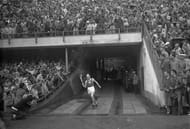
The Helsinki Olympics was a fitting tribute to Finnish Olympic hero Paavo Nurmi and his idol Juho Hannes Kolehmainen. They had the honor of leading the Olympic torch to the stadium, and then to the Olympic cauldron.
Kolehmainen was a long distance runner who won a double gold in 5000 and 10000 meters at the Stockholm Games in 1912. He ended his career on a high with a gold medal in the marathon at the Antwerp Olympics 1920.
Hannes Kolehmainen's journey inspired Paavo Nurmi, who joined the Finnish army. Making his debut at the same edition as Hannes's last, Paavo won three gold medals and one silver medal at Antwerp. He outdid his idol and won all five of his events at the 1924 Olympics. However, he held a grudge towards the Finnish authorities. Had they let him compete in the 10000 meters, he could have won a sixth gold in a row.
When the Olympics came to Helsinki, Kolehmainen and Nurmi were obvious choices to light the Olympic flame. Paavo brought the Olympic torch to the Olympic cauldron in a rain soaked stadium. Hannes lit the Olympic flame at the stadium tower.
#2 Emil Zatopek, the unconventional champion
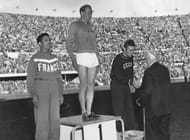
Emil Zatopek was a sensation at the 1952 Games. Hailing from Czechoslovakia, he was a simple man and a doting husband to athlete Dana Zatopkova. He had won a silver medal in the 5000 meters at the London Games.
However, it was at the Helsinki Olympics that he emerged as a true champion. After winning the 5000 meters gold, he took a risk and ran the 10000 meters. To everyone's surprise, he won.
But Emil Zatopek wasn't done yet. He decided to compete in the marathon at the last minute. He ran and won in the most simple, and yet the most hilarious way possible.
During the marathon, Emil Zatopek raced alongside British world record holder Jim Peters. After the first fifteen kilometers, Peters knew he had overtaxed himself. When Zátopek asked the Englishman what he thought of the race thus far, Peters chuckled that his pace was 'too slow'. However, Emil probably had no funny bones in his body. He simply accelerated. Peters did not finish, while Zátopek won the race and set an Olympic record in his first Marathon.
#3 Josy Barthel and his sweet gift to Luxembourg
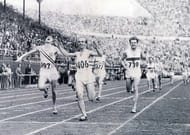
The Helsinki Olympics of 1952 was a sweet experience for Josy Barthel. He brought home something nobody ever expected - an Olympic gold medal.
Born in Luxembourg, Joseph's abilities as a runner were discovered during World War II. He was shot to fame when he clinched the 800 meters title at the Military World Championships in Berlin in 1947. The following year, at the Military World Championships in Brussels, Josy won both 800 m and 1500 m.
At the London Olympics, Josy failed to impress. He finished a modest 9th in the finals of the 1500 meters. But he was from Luxembourg; nobody was disappointed either. However, in Helsinki, things changed for the better.
Josy surprised everyone with his impressive run at the Helsinki Games. He won the 1500m with a very strong finish. Till date, this is the only gold medal won by Luxembourg at any edition of the Summer Olympics.
#4 Indian hockey's victorious march continues
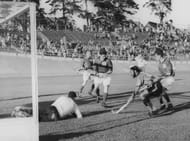
With the Helsinki Olympics, the victorious march of the Indian hockey team continued. If anyone had doubts about the Indian team's capabilities, they had already been laid to rest at the London Olympics.
However, at the Helsinki Games in 1952, India proved why they were the masters of world hockey. The team was led by Kunwar Digvijay Singh, a brilliant player who was touted to be the able successor to the legacy of Major Dhyan Chand.
Since they were the undisputed champions, India received a direct entry into the quarterfinals. They defeated Austria by 4-0 and booked a semifinal clash with Great Britain. The former masters were defeated once again, by 3-1.
India now faced the Netherlands. In a rematch of the London Olympics semifinal, the Dutch stood no chance. They were thrashed 6-1 as the hero of the London Olympics shone again. Balbir Singh scored 5 out of the 6 goals, an Olympic record as yet unbroken.
#5 Unsung victory for Kashaba Dadasaheb Jadhav
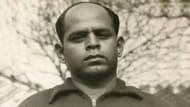
On July 20 1952, a young wrestler did what no one else could. KD Jadhav gave India their first ever individual Olympic medal as a free nation.
Born in Goleshwar, a village in Satara, Maharashtra, KD Jadhav was what every traditional wrestler was. However, he was very nimble on his feet. Rees Gardner, an English scout, spotted his talent and trained him for the London Olympics.
In 1948, KD Jadhav went to the London Olympics. Though unfamiliar with wrestling on the mat, Jadhav was a quick learner. He shocked everybody when he defeated Bert Harris of Australia. He went on to defeat USA's Billy Jernigan the next day. However, inexperience took its toll. He lost to Mansoor Raeisi of Iran and bowed out with a 6th rank.
At the Helsinki Games, Jadhav was stronger, better and more experienced. However, he had to fight for every penny to make it to the Games. He appealed to the then CM of Bombay State, Morarji Desai, for funds. When he was turned down, he was assisted by his college professors, teachers and the Maharaja of Patiala.
Despite the odds, Jadhav won his bouts one after the other. However, tragedy awaited. As he walked leisurely to the arena with his tracksuit on, he learned that he had been asked to fight the Soviet Union's Rashid Mammadbeyov. According to the rules, a break of at least 30 minutes was required between bouts, but no Indian official was available to press his case.
An exhausted KD Jadhav failed to impress and lost to Rashid. He further lost to Shohachii Ishii of Japan, the ultimate champion. However, the points he had collected earned him a bronze medal. Though KD Jadhav didn't win a gold, his efforts gave a newly independent India its first ever individual Olympic medal. Sadly, Jadhav never received the rewards he deserved. He died in penury.
